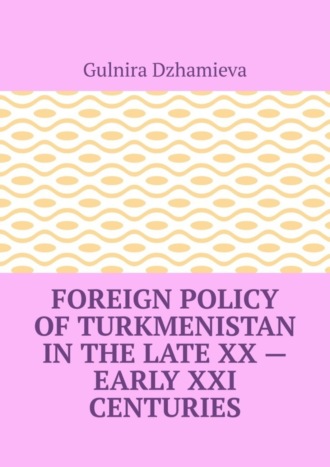
Foreign Policy of Turkmenistan in the Late XX – Early XXI Centuries
Turkmenistan maintains a real interest among other states in actions that contribute to the strengthening of this status. These actions take on various forms: political, economic, humanitarian, etc. Thus, over the past years, results have been achieved that have made it possible to seriously strengthen the position of Turkmenistan, which carries out peacekeeping activities in the region. For example, under the auspices of the UN, three rounds of inter-Tajik negotiations took place in Ashgabat, the results of which gave an important effect to resolve the internal national conflict in Tajikistan.
In addition, Turkmenistan organized a wide inter-Afghan round table, and on January 21—22, 1997, an international forum on Afghanistan was held in Ashgabat. Several rounds of inter-Afghan talks also took place there.
In this regard, it is appropriate to quote the words of Mohammad Nalir Zahir, First Secretary of the Afghan Embassy in Turkmenistan: “Today Turkmenistan is one of the few states that have consistently peaceful borders with all neighbors. This was achieved, in my opinion, due to the neutrality observed by the state and the “open door” policy proclaimed by the President of Turkmenistan, that is, those two important factors that help peacefully resolve conflicts by resolving all controversial issues exclusively at the negotiating table.

At the global level, Turkmenistan managed to build even partnerships with great powers and the main world centers of power – the United States, Russia, the European Union, China. In fact, the line declared by President Niyazov several years ago on Turkmenistan’s “equal advantage” to them (these centers), if we are talking about the combination of their interests in the region on the basis of fair and healthy competition, and, conversely, “equidistance” from them, when there is a question about the division (or rather, division) of spheres of influence.
At the regional level, Turkmenistan has established good-neighborly and equal relations with neighboring countries, major regional powers such as Iran and Turkey, Pakistan and India. Despite the ambiguity of relations between them, on the Turkmen geopolitical “platform” the interests of these states never entered into contradictions.
The fundamental and unconditional refusal to participate in international military and military-political groups and blocs allowed Turkmenistan not to be drawn into any form of regional rivalry. As well as the temptation of anyone to attract Turkmen military and economic resources to their side in potential conflicts. The military strategy of Turkmenistan is purely defensive in nature, it clearly spells out a ban on the use of the Turkmen Armed Forces outside its borders. This allowed Turkmenistan, without spraying financial, material and human resources for use outside the country, to focus on strengthening its own defense capability, modernizing the national army in accordance with modern requirements. Today, according to both Western and Russian experts, the Armed Forces of Turkmenistan are one of the most equipped and combat-ready in the region (which, however, is typical for neutral countries and in other parts of the world, for example, Switzerland and Sweden). At the same time, Turkmenistan does not refuse military-technical, but not conditioned by political requirements of cooperation at the bilateral level. With countries such as the USA, Russia, Turkey, Ukraine, it has been developing for several years and quite successfully. The same can be said about international cooperation in the fight against common threats for the region – terrorism, drug trafficking, transnational organized crime.
The neutral status of Turkmenistan, which determines the minimum level of foreign policy risks, coupled with the richest resource potential and internal stability, predetermined great interest in the country from first-class foreign companies and ensured a serious inflow of foreign capital into the national economy. Today, companies from the USA, Japan, Russia, Turkey, Iran, Israel, Arab states, Malaysia, China, India, EU states are successfully operating in Turkmenistan. With their participation, the textile industry was erected from scratch, the oil and gas complex and agriculture were modernized, large-scale road and housing construction was underway, the communication infrastructure was practically re-equipped, and the hotel business was developing. According to the World Bank, in terms of foreign direct investment per capita, Turkmenistan, since 1999, has consistently held a leading position in the post-Soviet space.
Having become an independent and sovereign state, Turkmenistan took its worthy place in the Community of Nations, in practice proving the correctness of its own development path, combining national identity and the achievements of modern civilization. Over the past short period by historical standards, Turkmenistan has withstood difficult tests with honor and has established itself as part of the world community not only as a sovereign and secular state, but also having a generally recognized status of permanent neutrality.
On the example of Turkmenistan’s foreign policy, developed and implemented under the leadership of the first President Saparmurat Turkmenbashi, the world community witnessed the emergence of a qualitatively new model in the practice of international relations. Turkmenistan offered the world the concept of peaceful and stable coexistence and development in the complex region of Central Asia.
Remaining faithful to the declared foreign policy and international obligations arising from its neutral status, independent Turkmenistan did not participate in any armed conflict, did not join any military, military-political alliance or bloc, nor did it join any international structure with functions beyond the scope of humanitarian assistance.
The main guidelines of Turkmenistan’s foreign policy were and remain the internal interests of the country, the solution of its socio-economic problems. It must meet the fundamental national interests, proceed from the primary and urgent problems of its own people and, first of all, the tasks of preserving sovereignty and independence, ensuring the processes of forming the statehood of Turkmenistan, protecting territorial integrity and creating conditions that ensure the stability and irreversibility of political and economic reforms.

The priority direction of Turkmenistan’s foreign policy in the long term is cooperation with the United Nations. The UN is not only a tribune with which states have the opportunity to express their views on certain issues of concern to them. Turkmenistan shares the thesis that the UN is designed to become the main and ineligible mechanism in ensuring comprehensive peace and security, the highest international authority in resolving emerging disputes and conflicts, and the UN Charter is the foundation of the world order of the 21st century. All possible assistance to increase the UN’s consolidating capacity, expand its peacekeeping functions, support the humanitarian initiatives of the organization and its specialized institutions – this sees Turkmenistan as its main task as a full member of the UN. Based on this, Turkmenistan will continue to actively cooperate with the UN, its structures and institutions, assisting them in the implementation of program goals and statutory tasks. The Turkmen National Association of UN Assistance will contribute to the effective implementation of this task.
Bilateral cooperation has been and remains a priority in Turkmenistan’s foreign policy. That is why its most important component in the next century will be, first of all, the further strengthening of cooperation with neighboring states, aimed at creating an environment of peace, harmony and good neighborliness in the region. Turkmenistan believes that only on the basis of mutual trust, non-interference in internal affairs, respect for territorial integrity and sovereignty, respect for the choice of each country of its own model of socio-political and socio-economic development, it is possible to provide conditions for the true well-being and progress of the peoples inhabiting the region.
Turkmenistan is entering the 21st century with clearly defined priorities for bilateral cooperation with neighboring countries, which is reflected in the “Long-Term Cooperation Program until 2010.”
The region of Asia, in which Turkmenistan is located, being the territory of a number of internal conflicts, undoubtedly has huge development potential. The most important prerequisite for this is the prospects for fruitful cooperation between the peoples of the region – the heirs of the richest centuries-old culture, deep historical traditions of peacefulness and good neighborliness. They have repeatedly proved their ability to independently find ways of consent and reconciliation, while rejecting any violent intervention from outside.

Turkmenistan is committed to the dynamic development of regional cooperation, which is confirmed by the example of the revival of the activities of the Organization for Economic Cooperation (IVF). Countries – members of IVF with more than 310 million people demonstrate the emergence of an influential subject of international relations, which at the same time indicates the birth of a new regional community, logically corresponding to the historical laws of the cultural and civilization unity of related peoples. The logic of cooperation between IVF member countries in the name of the revival of the region and the prosperity of its peoples fully coincides with the basic principles of Turkmenistan’s neutrality. The course towards the continuation of the “open door” policy will remain the core of Turkmenistan’s foreign economic strategy.
Turkmenistan in the 21st century in its regional policy will remain invariably committed to the principles of neutrality, non-interference in the internal affairs of neighboring countries, rejection of military force, active peacekeeping under the auspices of the UN, good neighborliness and cooperation.
Based on convention norms and world practice, Turkmenistan establishes a regime of free movement of foreign citizens throughout its territory.
In the next century, Turkmenistan intends to continue the implementation of the open-door economic strategy. The challenges faced by humanity at the turn of the millennium – the deepening energy crisis, disproportionate distribution of resources, food shortages – are fraught with serious shocks that pose the danger of undermining security and stability at the national and regional levels, irrational and inadequate perception by entire peoples and continents of their own destiny. In this context, in its foreign economic activity, Turkmenistan sees the main task in the withdrawal to international markets of serious resources that it possesses, first of all, energy.
Turkmenistan has consistently advocated a multivariable approach to the development of international energy pipeline infrastructure based on economic feasibility, for the triggering of the principle of supplementation, and not replacing one project with another. At the same time, when considering any projects, Turkmenistan is a supporter of a balance of interests and mutual benefits of all parties involved, the creation of an international legal mechanism aimed at ensuring the interests of suppliers, transit countries and consumers. Turkmenistan categorically does not accept the use of pipelines as an instrument of political pressure and economic diktat.

Our research results showed that Turkmenistan attaches particular importance to relations with neighboring countries with which it is associated with historical, political, economic and cultural ties. Turkmenistan considers relations with them, wide cooperation in all spheres as the most important guarantee of the preservation of its sovereignty and neutral status, the successful achievement of its foreign policy goals.
The foreign policy situation of Turkmenistan is such that its interests are faced with the interests of not only neighboring countries in the region, but also non-CIS countries.
In the current situation in Afghanistan, Turkmenistan cannot stand aside, since its security issues are directly related to the situation in Afghanistan, with which it borders. In this regard, Turkmenistan supports all projects related to improving the situation in the Islamic Republic of Afghanistan, as well as in order to improve the economic condition of Afghanistan, it designs and tries to implement projects in the energy and hydrocarbon spheres. Today, there is a project to deliver gas to the Islamic Republic of Afghanistan, and later on its territory, laying pipes for the transportation of Turkmen gas to non-CIS countries. In this case, Afghanistan will receive cheap Turkmen gas, and it will also be possible to receive payment for the use of Afghan territory, that is, for transit. Official Ashgabat provides its airports to deliver humanitarian aid to Afghanistan, as well as to refuel aircraft that carry humanitarian aid. Turkmenistan connects the gas issue with the Russian side, which is very important for both states. Evidence of this is the controversial situations that have arisen recently.
CHAPTER II. TURKMEN FACTOR IN THE SYSTEM OF INTERNATIONAL RELATIONS OF CENTRAL ASIA
By the time of the collapse of the Soviet Union, Turkmenistan, of the state-forming features, had only a certain territory and poorly developed administrative power over it. All other important state-forming signs: a single socio-cultural space, general civil self-identification, a single legal consciousness of the population, self-sufficient economic and institutional infrastructure – were absent and are still under formation.
The territorial integrity of the country has not yet been recognized by neighboring states at the official level, and territorial claims immediately appeared on the unofficial one against Turkmenistan. In particular, Uzbekistan did not particularly hide its claims on the border territory of the Tashauz and Charjou regions, inhabited mainly by ethnic Uzbeks. And this not all well-known fact in May 1992 became the subject of discussion at a closed session of the Parliament of Turkmenistan. Some concern of his leadership was also caused by political instability in some CIS states, which under certain circumstances could spread to the territory of Turkmenistan.
In addition, according to forecast data, the bowels of Turkmenistan store almost a third of the world’s hydrocarbon reserves.

Immediately after the collapse of the Soviet Union, it would be very reasonable to think of the Central Asian region as a single community with a single set of problems that could be solved using coordinated and integrated solutions. Now, ten years later, the situation has clearly changed. The development of Kazakhstan, Turkmenistan, Kyrgyzstan, Tajikistan and Uzbekistan went on different paths, each of these countries acquired its own appearance and developed a unique style of decision-making.

The emergence of new states in Central Asia has fundamentally changed the political picture not only in the region, but also beyond its borders. If, as part of the Soviet Union, Central Asia was the periphery of a single geopolitical space, then with its collapse it moved to the center of political processes taking place in the vast expanses of Eurasia, and became the object of geopolitical confrontation between world and regional centers of power.
The countries of the region almost from scratch began to search for their new identity and forms of domestic political structure, adequately reflecting the interests of society. In addition, they should have developed priority foreign policy directions, which, first of all, should have led to the creation of a system of sustainable state and regional security and determine the place and role of each state in the field of international relations.
Attempts made within the CIS, the Central Asian Economic Union, the Shanghai Forum and other integration entities to create a regional security system that guarantees the military-political and socio-economic stability of the region have not yet yielded the expected results. The likelihood that such a system will appear in the near future is extremely small. The main reasons for this are the mutually supervising economic potential of the countries of the region, mutually exclusive tactics and a strategy for achieving their economic well-being, which prompts an independent search for foreign economic and foreign policy partners. At the same time, geopolitical unity is forgotten, the feasibility of consolidated actions aimed at ensuring regional security is ignored. Moreover, there are discrepancies in the assessment of security threats, with all the ensuing consequences.

Turkmenistan, like other post-Soviet countries, became independent completely unexpectedly: neither its leadership nor the population even thought about the possibility of such a turn of events. Indicative in this regard is the result of the 1989 All-Union referendum. Then over 90% of the population of the republic voted for the preservation of the USSR and for staying in its composition.
With such initial conditions for creating their own statehood, any sluggishness of political leadership could lead to the fact that the country would become an apple of discord between regional centers of power or turn into a raw material appendage of any of these centers of power.
The idea of the Afghan route began in May 1992, during business consultations between President of Turkmenistan Saparmurad Niyazov and Prime Minister of Pakistan Nawaz Sharif during a working session of heads of government of IVF countries in Ashgabat. The result of this meeting was an agreement on the construction of a gas pipeline and a highway connecting the two countries through the territory of Afghanistan. Subsequently, at different levels, similar discussions took place in Pakistani cities on February 6—7 in Kuwait and November 28, 1993 in Islamabad.
In April 1994, during a visit to Ashgabat, a delegation of the Pakistani Air Force, led by Vice Marshal Farug Usman Haider, reached an agreement on bilateral military cooperation and the Pakistani side took over the organization of the Turkmenistan Air Force Academy. In addition, Pakistan has pledged to train military specialists for Turkmenistan in its educational institutions.

In March 1995, in Islamabad, Pakistani Prime Minister Benazir Bhutto and president of Turkmenistan Saparmurad Niyazov signed a memorandum on the construction of a gas pipeline from Turkmenistan through Afghanistan to Pakistan and on the restoration of the highway from Pakistani Khaman to the city of Turgundi on the Afghan-Turkmen border.
Such intensive meetings and the agreements reached during them indicate the interest and determination of both parties in the implementation of their goals.
After the Taliban (organization prohibited on the territory of the Russian Federation) captured Kabul and the troops of Ahmad Shah Masood and General Dostum retreated to the north of the country, the leaders of the Central Asian republics began to take measures to strengthen the security system of the region.

On October 4, 1996, an emergency consultative meeting of the heads of state of Central Asia and Russia was convened in Almaty to discuss the situation in the region after the capture of Kabul by the Taliban (organization prohibited on the territory of the Russian Federation). The presidents of Kazakhstan, Kyrgyzstan, Tajikistan, Uzbekistan and the chairman of the Russian government attended the meeting. As a result, a joint statement was signed expressing concern about the events in Afghanistan and noting that any possible actions that undermine stability on the borders of Afghanistan with the CIS states will receive an adequate response. The leadership of the CIS Collective Security Council was instructed to create a task force to analyze the situation, as well as prepare proposals for its stabilization near the borders of Afghanistan, and the CIS Council of Defense Ministers was asked to develop proposals for ensuring security at these borders. In addition, the participants in the Almaty meeting recommended that the UN Security Council immediately hold a meeting on the Afghan issue.
§1. COOPERATION BETWEEN TURKMENISTAN AND CENTRAL ASIAN COUNTRIES
Turkmenistan’s policy of permanent neutrality has become an important factor in maintaining regional security and stability. Turkmenistan, using its capabilities as a neutral state, pursued an active constructive policy in the region aimed at creating conditions for a peaceful, non-violent resolution of contradictions and conflicts. The Turkmen principled position of non-interference in the internal affairs of Afghanistan prepared conditions that made it possible to begin the process of finding a political dialogue between the warring Afghan parties. In March 1999, representatives of the Taliban and the Northern Alliance sat first at the negotiating table in Ashgabat. Such an active and constructive policy of Turkmenistan, pursued in line with the efforts of the UN, gained him high authority among neighboring states and in the region as a whole, rightfully nominated Ashgabat to the category of recognized peacekeeping centers in Asia.
In its economic policy, Turkmenistan has proclaimed and consistently implements the principle of “open doors,” aimed at mutually beneficial cooperation with all states, creating equal conditions for the effective operation of foreign companies on its territory, regardless of their nationality and form of ownership. This approach of Turkmenistan ensures the steady interest of foreign partners in trade and economic cooperation with Turkmenistan, promotes the formation of a healthy investment climate in the country, and ensures the progressive development of its economy.
Конец ознакомительного фрагмента.
Текст предоставлен ООО «Литрес».
Прочитайте эту книгу целиком, купив полную легальную версию на Литрес.
Безопасно оплатить книгу можно банковской картой Visa, MasterCard, Maestro, со счета мобильного телефона, с платежного терминала, в салоне МТС или Связной, через PayPal, WebMoney, Яндекс.Деньги, QIWI Кошелек, бонусными картами или другим удобным Вам способом.
Приобретайте полный текст книги у нашего партнера:

